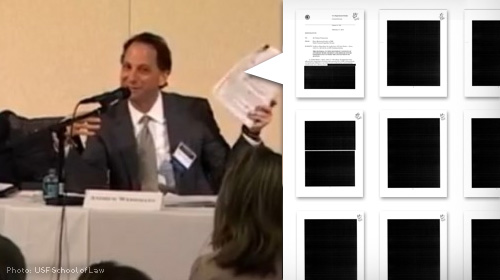In Court Thursday: Demanding the Justice Departmentโs Secret Memos on GPS Location Tracking


I will be in a New York federal courtroom tomorrow to argue that the Justice Department must release two key memos providing guidance to federal prosecutors and investigators for using GPS devices and other location tracking technologies. In response to the ภฯฐฤรลฟชฝฑฝแน๛'s Freedom of Information Act lawsuit, the government has, in a way, already released the memos in question โ but they were almost entirely censored. (You can see them in all of their redacted glory here and here.)

Transparency for the rules the government uses to perform invasive surveillance is essential for the public to determine the wisdom of these policies. This is just as true for general law enforcement as it is for the NSA's national security related activities now being hotly debated.
The Justice Department claims that it should not have to turn over the memos because they are attorney work-product. While we agree that executive branch lawyers should be able to freely discuss legal theories, once those opinions become official government policy the public has an absolute right to know what they are. Otherwise, the government is operating under secret law that makes accountability to the people impossible.
The memos in this case were written in the wake of the Supreme Court's landmark decision in U.S. v. Jones, which held that the government's attachment and use of a GPS tracker to monitor a car's movements is a "search" within the meaning of the Fourth Amendment. Although Jones was a major victory for privacy, it also left a host of unanswered questions about the proper use of surveillance technologies going forward. The court did not decide whether the government must obtain a warrant to use GPS devices, nor did it explain how the Fourth Amendment applies to other types of location tracking technology, such as cell phone tracking, domestic surveillance drones, and license plate readers.
While we wait for the courts to hash out these difficult issues, the political branches are setting polices that are determining how much privacy Americans have in our movements over the course of weeks or months โ movements that paint a very detailed picture of our personal and professional lives. That is why these memos are so important. And yet the only reason we even know about their existence is because FBI General Counsel Andrew Weissmann happened to mention them in a law school talk that ended up on YouTube (you can watch it ).
One of the memos instructs investigators about when they can use GPS tracking devices, while the other explains how Jones applies to, as Weissmann put it, "other types of techniques, beyond GPS."What "other types" does he mean? Probably at least cell phone tracking, perhaps license plate readers, or drones, or something else altogether. We don't know what the government thinks its constitutional obligations are in these areas โ and that's the problem.
Democracy requires accountability. The people have a right to know what checks the executive branch has put in place to regulate law enforcement's use of the powerful new surveillance tools at its disposal. Without that knowledge, we cannot have an informed public debate about whether the government has struck the right balance between effective law enforcement and respect for Americans' privacy. That is why the ภฯฐฤรลฟชฝฑฝแน๛ is asking the court to order the Justice Department to release these memos to the public โ without 99 percent of them redacted.

